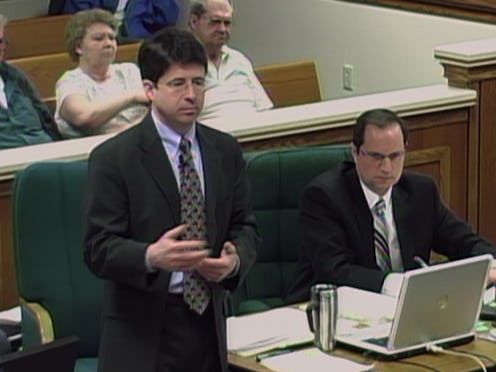News
Steven Avery's Lawyers Didn't Make Much Money

The 2007 murder trial for the death of 25-year-old Teresa Halbach was a high-profile case at the time and became an even bigger deal after the Netflix documentary series Making a Murderer aired. Steven Avery, currently serving life in prison for the crime, was represented by defense attorneys Dean Strang and Jerry Buting, who became legal celebrities and gained a swarm of admirers after the show's release. Because Avery's case was a major event, especially in Wisconsin, it would be reasonable to assume that his lawyers made a lot for their tireless efforts, but Strang and Buting didn't make much money for Avery's defense.
In the show, it's explained that Avery reached a $400,000 settlement with the state in 2006 for his $36 million lawsuit against Manitowoc County after he spent 18 years in prison for a sexual assault he didn't commit. Because he was charged with Halbach's murder in 2005, before his lawsuit had concluded, he needed the money to pay for his defense. When just presented with the facts that Avery received $400,000 that he used to acquire Strang and Buting as his defense team, it seemed like the whole $400,000 went to the law duo, but that wasn't the case.
In an interview with Allen St. John for Forbes published Sunday, Strang explained that a chunk of Avery's settlement went to the civil lawyers who handled the lawsuit for their work and reimbursements for their out-of-pocket expenses, like investigations and depositions. According to Strang, civil lawyers typically take one-third of what a client's awarded as their fee, but Avery's civil lawyers (Walter Kelly and Stephen Glynn) took less. It wasn't revealed how much Kelly and Glynn took as payment, but overall, the civil lawsuit cost Avery $160,000.
Strang told Forbes that Buting and he split the remaining $240,000. If you're thinking that sounds like quite a bit of money, you're right — it is. However, the defense team didn't get to keep all of that for themselves. Strang explained that big cases like Avery's require a lot expenses, including private investigators, subpoenas, transcripts, scientific testing, and a nearby apartment for the two men throughout the seven-week trial.
Once the $240,000 ran out, that was it — Strang and Buting knew Avery wouldn't have any more money to compensate them. "Jerry and I talked about it. Do we get into this, knowing, before Day 1, that we're going to end up losing a substantial amount of money?" Strang told Forbes. "For both of us, the answer was yes."
Strang said that he and Buting probably worked more than 2,000 hours each during the 16 months they represented Avery, leading St. John to estimate that, in the best case scenario, they made about $9 an hour — not much more than the federal minimum wage.
Not only did they defend a man many assumed was guilty, but they also did so for very little in return. If you didn't already have a major crush on Strang and Buting, knowing that money wasn't a factor in choosing to represent Avery might probably produce a few butterflies.
Images: Making a Murderer/Netflix